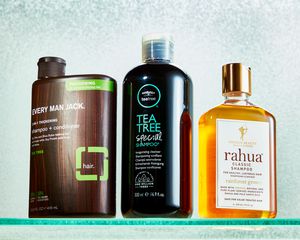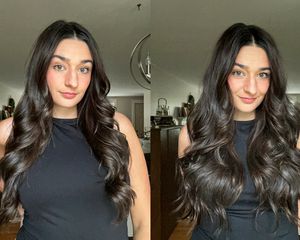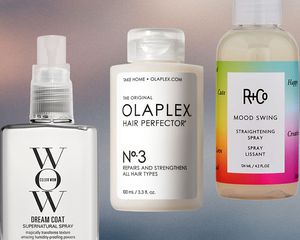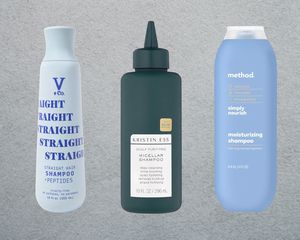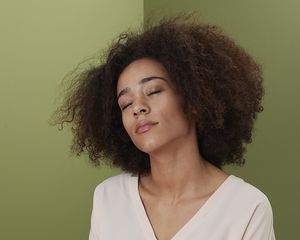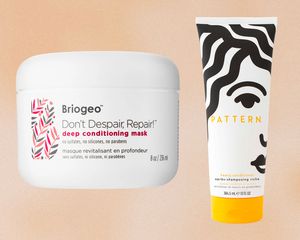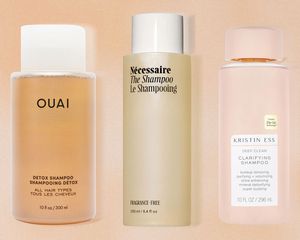:max_bytes(150000):strip_icc()/GettyImages-1221892988-3a015472932e4aaaa6603740798e54ca.jpg)
Scan the label of any moisturizer or lotion, and you're likely to see a recurring ingredient: glycerin. Glycerin has been quietly dominating the skincare arena for years as part of many popular formulas. Recently, the beauty community has begun to seek it out on its own to treat a variety of skin issues. Glycerin is effective as a moisturizer because it acts as a humectant, pulling moisture from the environment and deep within the skin to the surface, which needs the moisture most. Many hair types suffer from dryness and could benefit from the moisture boost glycerin provides to the skin's surface. That's why we wanted to chat with dermatologist Ava Shamban and trichologist Gretchen Friese for their expertise on using glycerin for hair and scalp health. Keep reading to learn more about the benefits of glycerin for hair, and how to use it.
Meet the Expert
- Ava Shamban, a board-certified dermatologist at AVA MD and co-founder of SKIN FIVE
- Gretchen Friese, a BosleyMD-certified trichologist and salon director and stylist at Foushee salonspa
What Is Glycerin?
Glycerin is a sugar alcohol that can be derived from a range of sources including animal products, plants, and petroleum or synthetically made. It is specifically classified as a humectant.
Glycerin for Hair
Type of ingredient: Hydrator and antimicrobial
Main benefits: Hydrates the scalp, eliminates breakage, and fosters a healthy scalp environment.
Who should use it: In general, anyone with thick, coarse, dry, or dehydrated hair, but can be beneficial to all hair types. Those with freshly colored hair may want to avoid use until after 1-2 washes.
How often can you use it: It should be applied weekly to observe results and can be used up to 3 times weekly.
Works well with: Aloe vera
Don’t use with: There are no known ingredients that negatively interfere with glycerin.
Benefits of Glycerin for Hair
Glycerin, or glycerol, is known to be the most effective humectant. As such, it draws in moisture to the hair and scalp. Additionally, it helps to create a barrier to prevent moisture from leaving the skin and hair follicles. Shamban explains that "it has a small molecular size and can draw in moisture into the cells of both scalp and hair." This can be especially helpful during the dry winter months when dry scalp conditions may lead to itching and flaking.
Glycerin's ability to attract and maintain moisture makes it extremely beneficial to the scalp's overall health. Adequate hydration of the scalp's skin can prevent a host of issues, including dandruff and oil overproduction. Healthy hair starts at the scalp, making scalp health paramount in treating hair concerns.
- Boosts Scalp Hydration: Glycerin draws water into the scalp from the environment, which provides needed hydration, and according to Shamban, it prevents TEWL (Transepidermal Water Loss).
- Regulates Sebum Production: The infusion of moisture from glycerin helps to regulate oil production in the scalp.
- Antimicrobial Properties: The antimicrobial properties of glycerin can help treat itchiness caused by dryness or dandruff, Friese explains.
- Moisturizer for Dry Hair: Friese shares that "Glycerin is a natural humectant. This means that it will draw moisture to the hair and keep it there." Shamban adds that glycerin has the ability to attach to the hair keratin preventing moisture evaporation.
- Improves Overall Scalp Health: Friese details the benefits glycerin has for overall scalp health, stating that "because Glycerin returns moisture to dry hair and improves the scalp layer, also by moisturizing, it can help create a healthy scalp environment."
- Strengthens Hair: Hydration is an essential defense against hair breakage. Shamban explains that "optimal hydration and moisturization can maintain strength, health and improve the appearance of the hair."
- Targets Frizz: Glycerin reduces hair dehydration, frizz, and breakage. Shamban suggests "it can therefore also work well for some types of natural hair to maintain or enhance the curl pattern and eliminate frizz."
- Can Aid in Hair Growth: By contributing to scalp health, glycerin can contribute to new hair growth. Shamban clarifies that it should be considered a "great fertilizer helping plants to grow. Glycerin helps create the environment for better hair growth."
Hair Type Considerations
Our experts agree that glycerin is safe for all hair types but can be especially beneficial to those with thick, coarse, dry, or dehydrated hair. Shamban illustrates the effect glycerin can have on coarse or curly hair, saying, "there is a range of porosity for hair that dictates the efficiency of humectants and oils passing through the cuticle. The more tightly bound the hair, the less porous the hair. With high porosity and a more open cuticle, the hair has better absorption of glycerin leading to improved hydration."
Friese does caution use of glycerin on freshly colored hair, as it may strip color. She recommends waiting one-to-two washes before using glycerin in colored hair.
Both experts agree that glycerin reactions are uncommon, but a patch test should be conducted before using it all over the hair and scalp.
How to Use Glycerin for Hair
Glycerin is already found in many commonly used beauty products, making it easy to incorporate into your routine. Those looking to take full advantage of its effects should source glycerin in its pure form. However, Shamban urges the importance of researching the purity, derivation or source, and strength when purchasing glycerin. She cautions that it can be highly occlusive on its own and needs to be diluted.
- Make a Glycerin Spray: Friese recommends creating a glycerin spray with water that acts as a detangler or leave-in treatment and can be used after washing and conditioning hair. She adds that you should experiment to see how much is needed to achieve your regular hairstyle still.
Ingredients:
- 2 tablespoons glycerin
- 1/2 cup water
- 2-3 drops essential oil, such as rosemary or peppermint (optional)
Directions:
- Mix all ingredients together in a bowl.
- Carefully funnel into a spray bottle.
- Spritz onto wet or dry hair, as needed. (If your hair ends up sticky, add more water to the mixture)
- Create a Mask: Friese suggests that a glycerine hair mask can be created that is rinsed out before conditioning (use one-to-two times a week). Make sure to apply the mask to all strands.
Ingredients:
- 1 tablespoon glycerin
- 1 tablespoon aloe vera
- 1 beaten egg
- 1 tablespoon honey
Directions:
- Mix all ingredients together until fully combined.
- Apply evenly onto hair and let sit for 30 minutes.
- Rinse out with shampoo and conditioner.
- Add Glycerin to Conditioner: If your conditioner does not already have glycerin in it, you can add glycerin to the bottle. Apply enough conditioner to cover all hair strands and leave on for at least 5 minutes before washing out.
- Purchase Glycerin-Rich Products: Glycerin is usually one of the top ingredients in moisturizing shampoos and conditioners. Shamban recommends purchasing these products to ensure you are using the correct amount of glycerin for hair.
- Apply as a Pre-Wash Treatment: Before washing, treat the hair with a blend of one-part glycerin, one-part carrier oil, and a few drops of essential oil. Shamban recommends brushing this mixture through dry hair before washing.
- Use as a Deep Conditioning Treatment: After shampooing, apply a mixture of aloe vera and glycerin to damp hair and leave on for 15-20 minutes. Shamban recommends rinsing it out to avoid irritation.
Spritz on this texture spray to get tousled hair with flexible hold. Salt helps to contract the hair while cane sugar and glycerin acts as a natural humectant to give you soft, touchable texture.
Glycerin shows what it can do for hair growth in this serum combined with ingredients like curcumin, red clover, and mung bean. All it takes is a dropper full of product massaged onto your scalp daily to start to see longer, thicker, and healthier hair.
If you have curly hair, look no further than this leave-in conditioner that is perfect for air drying or diffuser use. It's lightweight but full of moisturizing ingredients like castor oil, glycerin, and babassu.
While a little on the expensive side, the No Frizz Shampoo contains a patented molecule that protects against humidity and reduces hair friction for sleeker, shinier hair.

